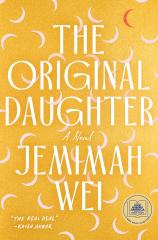Reading Group Guide
Discussion Questions
The Original Daughter

1. Have you ever held a grudge against, or been in an argument with, someone you love and wondered, like Genevieve, if it was too late to reconcile? How did Gen and Arin’s falling out resonate with you, and did it offer a different perspective on your personal conflict? Consider Gen’s sentiment at the end of the novel: “An existence animated by anger wasn’t the same thing as a life” (343).
2. Although the novel is written in Gen’s point of view, could you imagine Arin’s experience of her childhood, her rise to fame, and her last moments with her dying mother? Did she deserve Gen’s resentment?
3. Discuss where in Gen and Arin’s sisterhood their divergence began. Do you think it was doomed from the start, when they attempted to send her back home to Malaysia, or were there tiny fissures along the way as they competed for praise, accomplishment and a sense of belonging?
4. Genevieve works extremely hard in school to earn top grades and her mother’s approval, whereas Arin’s success as an actress seems to be accidental or from luck. Have you ever been on either side of this dynamic, and how did you deal with watching the other person’s work (or lack thereof)?
5. Do you think Arin’s “Land of Opportunity” essay was written from a genuine place? How do the sentiments of that essay shed light on her inner world and feelings toward her birth family and homeland that Gen’s perspective cannot express --- or understand?
6. How do you think Arin’s future would have unfolded without Gen’s help in preparing for that first YouTube role? And vice versa --- if Gen had grown up as the only, “original” daughter with her parents? Consider similar “what ifs” about your own life and if you’d have wanted circumstances to be different in the end.
7. Did Su treat her daughters equally throughout their lives? Consider Gen’s thought when she declares she’s leaving for New Zealand: “…how much happier they’d be if I left, how much more comfort Arin was able to provide my mother, when I, her firstborn and original daughter, must have represented only a lifetime’s accumulation of disappointment” (203). On what grounds does she think her mother is disappointed in her?
8. How does Gen’s father leaving affect her connection and commitment to her family? Do you think she ever truly forgives him? Discuss their conversations at her mother’s deathbed, as well as Su’s reaction to his return.
9. Discuss the sense of expansion and independence that Gen finds in New Zealand. Do you think she truly enjoys her experience, or is it more of a reaction to, or release from, the strain and competition she felt at home?
10. How does Gen’s relationship with her community in New Zealand --- Micah, Hannah, Lily, Lorraine --- change after Arin’s visit? Does she feel a loss of identity, or a reminder that she hasn’t had her own identity since Arin arrived as a little girl?
11. Do you think Arin consciously manipulated Gen after the assault to be more successful in her film role? How might Gen have recovered from the assault, and her sexual encounter with Micah, without her sister’s support?
12. Have you, or do you know anyone who has, experienced assault or harassment? Discuss the sensitivities around sharing the events with authorities and/or with friends and family. How do media representations of assault skew the reality of this common, yet often overlooked and minimized, experience?
13. How does the earthquake in New Zealand parallel the inner turmoil that Gen feels after the “premiere” of Arin’s film?
14. How does the rise of media and social media overlay with the events of the novel? Could this story have happened in another time period, and how might other social circumstances/facts have changed the plot?
15. What is unique about the kind of fame that Arin achieves? Does the fact that she started as a YouTube star change the authenticity of her celebrity, compared, for instance, to actors with roots in theater or more traditional drama? If Gen hadn’t cut her out of her life, do you think Arin’s fame would have affected the whole family? Consider Gen’s assessment: “Anyone who’s ever had the slightest brush with fame understands that it’s like contagion. Once you’ve let your image out you can’t sweep it back into a jar, the only way forward is through” (309).
16. How do the sisters’ attitudes differ around receiving help with their various goals? Consider what Arin did to procure investment in her debut film, and Gen’s desire to set off on her own in New Zealand.
17. Both Gen and Arin act as caretakers to Su in different ways during their lives. How would you characterize the sacrifices each makes for their mother, and the versions of Su that each daughter gets to know and spend time with? How does cultural expectations play into their sense of loyalty to their mother and home? Have you ever supported someone through end-of-life care and/or witnessed a death like the family does in the novel?
18. “Love is an action word, I thought. It can be committed, like a crime,” thinks Gen in her final contact with Arin after the earthquake in New Zealand (299). What acts of love are committed in the book, and which would you consider to be “crimes”? Who is hurt the most because of their love?
19. After Su’s death, Gen frantically searches for her and Arin’s contract of sisterhood but cannot find it. What would it have meant if she did find it?
20. Were you surprised by what you found on the last page of the book? While reading, did any scenes in the novel strike you as especially cinematic?
The Original Daughter
- Publication Date: May 6, 2025
- Genres: Fiction, Women's Fiction
- Hardcover: 368 pages
- Publisher: Doubleday
- ISBN-10: 0385551010
- ISBN-13: 9780385551014







